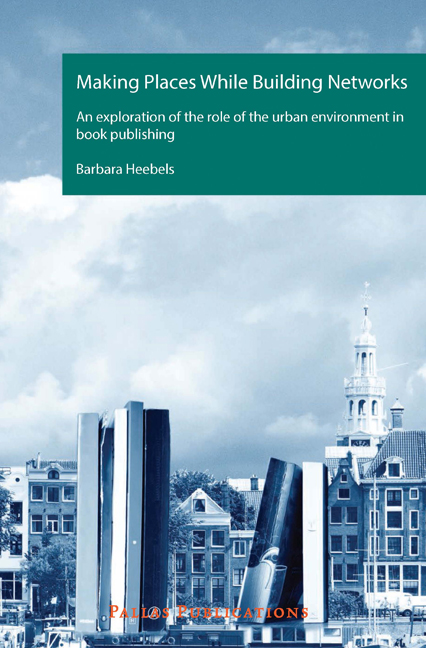Book contents
- Frontmatter
- Dedication
- Contents
- 1 Introduction
- 2 Creative Clusters in Berlin: Entrepreneurship and the Quality of Place in Prenzlauer Berg and Kreuzberg
- 3 Performing in Dutch Book Publishing 1880–2008: the Importance of Entrepreneurial Experience and the Amsterdam Cluster
- 4 Place-making from Publishing house to Book Fair: Dutch Book Publishers and the Role of Place in Establishing Trust and Reputation
- 5 Social Networks and Cultural Intermediaries: the Multiplexity of Personal Ties in Publishing
- 6 Conclusions
- References
- Appendix A Descriptive Statistics & Correlations
- Appendix B Characteristics of Interviewees
- Nederlandse Samenvatting
4 - Place-making from Publishing house to Book Fair: Dutch Book Publishers and the Role of Place in Establishing Trust and Reputation
Published online by Cambridge University Press: 20 January 2021
- Frontmatter
- Dedication
- Contents
- 1 Introduction
- 2 Creative Clusters in Berlin: Entrepreneurship and the Quality of Place in Prenzlauer Berg and Kreuzberg
- 3 Performing in Dutch Book Publishing 1880–2008: the Importance of Entrepreneurial Experience and the Amsterdam Cluster
- 4 Place-making from Publishing house to Book Fair: Dutch Book Publishers and the Role of Place in Establishing Trust and Reputation
- 5 Social Networks and Cultural Intermediaries: the Multiplexity of Personal Ties in Publishing
- 6 Conclusions
- References
- Appendix A Descriptive Statistics & Correlations
- Appendix B Characteristics of Interviewees
- Nederlandse Samenvatting
Summary
Abstract
In-depth interviews with Dutch book publishers revealed that placemaking rather than geographical proximity is important for establishing trust and building a reputation as a publisher. Although Amsterdam is at the centre of social networks within the field of Dutch literature, being located in the Amsterdam publishing agglomeration is not crucial for Dutch publishing houses. Inner-city Amsterdam and its many meeting places play an important role in socialization and are employed to enhance a publisher's status, but other places – both fixed and temporary and on multiple levels of scale – are created to generate trust in vertical relations and to build reputations. By including the dimensions of place as locale and place as experience, and by focusing on reputation and trust rather than primarily on innovation and knowledge exchange, this study shows that while place matters for cultural intermediaries such as publishers, its role is more nuanced than in cluster success stories.
Introduction
This paper examines how book publishers use place in building reputations in a cultural field and in developing relationships of trust in the book value chain, and critically assesses the importance of the Amsterdam publishing agglomeration for developing and selling books. Previous studies on the clustering of cultural-product industries in urban areas consider the local environment crucial for the performance of cultural-product firms (e.g. Crewe & Beaverstock, 1998; Currid, 2007). Many studies on cultural-product industries have investigated horizontal inter-firm networks and emphasize the importance of face-to-face contacts and geographical proximity for the exchange of knowledge (Bathelt & Boggs, 2003; Scott, 2004). A number of authors, however, have recently been more critical about the positive influence of urban clusters on the performance of cultural-product firms and the role of knowledge exchange between firms within such clusters (Sunley et al., 2008; Heur, 2009; Heebels & Boschma, 2011). This paper shows that in the case of Dutch book publishing geographical proximity is not important for knowledge exchange yet various dimensions of place are important for creating and maintaining trust and reputation which is vital for doing business as cultural intermediary. The paper contributes to the localized network literature by examining the role of place as a multifaceted process and the role of network relations and face- to-face contacts for purposes other than just knowledge exchange.
- Type
- Chapter
- Information
- Making Places While Building Networks An exploration of the role of the urban environment in book publishing , pp. 85 - 110Publisher: Amsterdam University PressPrint publication year: 2012



